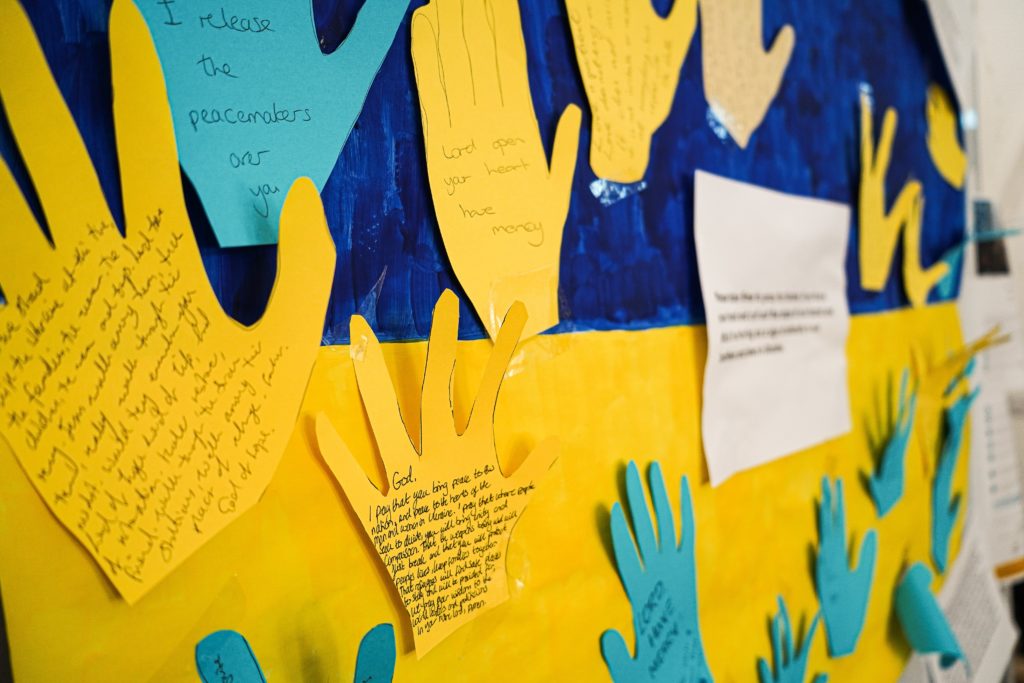Tijdens de recente bijeenkomst van het Central Committee van de Wereldraad van Kerken in Genève, is er een uitgebreid bericht opgesteld omtrent de oorlog in Oekraïne en de rol die de kerken kunnen spelen in het bevorderen van vrede. Hieronder volgt de tekst in het Engels.
WCC Central Committee Statement on the War in Ukraine
“Turn away from evil and do good; seek peace and pursue it.” Psalm 34:14
“Blessed are the peacemakers, for they shall be called children of God.” Matthew 5:9
Member churches of the World Council of Churches have proclaimed together that Just Peace is a pilgrim journey into God’s purpose for humanity and all creation (Ecumenical Call for Just Peace). The way of Just Peace draws us to the example of Jesus of Nazareth, a collaborative search for the common good, and a holistic and systemic approach to reconciling conflict. For “the life and teachings, the death and resurrection of Jesus Christ, point toward the peaceable kingdom of God.”[1] Living in the greater hope given to us in the life, death, and violence-overcoming resurrection of Jesus Christ, we have committed ourselves to seek the common good of all.
Every human being is made in the Image of God. Women and men, children and elderly, civilians and soldiers, the wounded and dying, those who grieve and those who fear, those displaced and those who stay at home, all bear the Imago Dei. We are all called to become more Christ-like in this moment, to turn from lack of concern, from greed, from anger to be transformed more completely into a global human community who live in the fullness of life and recognize the dignity and respond to the needs of each.
We participants in the meeting of the World Council of Churches’ central committee in Geneva, Switzerland, on 15-18 June 2022, are all deeply affected by what has happened in Ukraine since our last meeting on 9-15 February 2022, for when one part of the body suffers, all parts suffer with it. We are in Christian solidarity with all those who suffer in this conflict. Our hearts grieve that, after eight years of unresolved crisis and conflict in the eastern regions of Ukraine, on 24 February 2022 the Russian Federation launched an illegal invasion of its neighbour, a sovereign state. This tragic development represents a terrible failure of diplomacy, responsibility and accountability to international law.
We lament that fact that, as a result, the people of Ukraine are enduring an appalling toll of death, destruction and displacement. Thousands of Ukrainian civilians have been killed, cities such as Mariupol have been laid in ruins, and more than 14 million people – over one-quarter of the entire population of Ukraine – have fled their homes. Moreover, there are many reports of atrocities which may constitute war crimes and crimes against humanity, including sexual and gender-based violence, as well as greatly heightened vulnerability to human trafficking. The conflict is accompanied by a massive proliferation of weapons in the region, but weapons cannot provide a solution to this crisis; the only real solution is to “seek peace and pursue it”.
The effects of this conflict also threaten to tip many millions of already food-insecure people into famine in several countries around the world, to provoke widespread social and political instability, to destroy the post-World War II international security architecture, to provoke a new global arms race, and to accelerate our trajectory towards climate catastrophe at a time when the nations of the world should finally be uniting to confront this common existential threat in order to limit global warming to 1.5°C.
The central committee appreciates and affirms the various initiatives taken by the WCC and its members and ecumenical partners with regard to the situation in Ukraine, dating back to before the initial crisis of 2014, and especially since the invasion on 24 February 2022. The central committee affirms the acting general secretary’s clear denunciation of the armed aggression launched on that date and his reiterated appeals to stop the war, and welcomes the other initiatives that have been undertaken, including the two ecumenical roundtable meetings convened by the WCC (30 March and 10 June 2022), and the visits jointly with ACT Alliance to local churches and related organizations receiving and caring for refugees from Ukraine, both in Hungary and Romania (14-18 March 2022), and in Russia (21-26 May 2022).
Grave concerns are being raised in the ecumenical fellowship about any misuse of religious language to justify or support armed aggression, in sharp contrast to the Christian calling to be peacemakers. A fresh and critical analysis of the Christian faith in its relation to politics, the nation and nationalism is urgently called for.
The central committee lifts up the outcome of the Inter-Orthodox Pre-Assembly Consultation (held in Cyprus on 10-15 May 2022) in which participants expressed their “grave concern over the armed conflict in Ukraine that has already claimed many people’s lives” and were “unanimous in condemning the wars and call upon all the parties involved in the conflicts to do everything within their power for the urgent establishment of peace and for ensuring safety in Ukraine, Russia, Europe, and the whole world.” They also condemned “systematic campaigns of disinformation that promote divisions and hatred.”
Especially from an ecumenical perspective, encounter and dialogue is of central importance in such a situation, and we underline the observation made by participants in the second roundtable meeting convened by the WCC on 10 June 2022, that “The calling to dialogue, encounter, and the pursuit of mutual understanding is the very essence of ecumenism. Division and exclusion is the antithesis of the purpose of our movement.” We acknowledge and welcome the commitment of the Moscow Patriarchate – representing the WCC’s constituency in both Russia and Ukraine – to engage in encounter and dialogue on the situation in Ukraine under the auspices of the WCC, though circumstances prevented them from taking part in either of the two ecumenical roundtable meetings so far convened. However, dialogue remains an obvious urgent necessity to address such a critical situation for the people of Ukraine, for the future of the world, and for the ecumenical movement.
The central committee:
Deplores the illegal and unjustifiable war inflicted on the people and sovereign state of Ukraine. We lament the awful and continuing toll of deaths, destruction and displacement, of destroyed relationships and ever more deeply entrenched antagonism between the people of the region, of escalating confrontation globally, of increased famine risk in food insecure regions of the world, of economic hardship and heightened social and political instability in many countries.
Declares that war, with the killing and all the other miserable consequences it entails, is incompatible with God’s very nature and will for humanity and against our fundamental Christian and ecumenical principles, and rejects any misuse of religious language and authority to justify armed aggression.
Reiterates the appeal of the global fellowship of churches represented in the WCC for an end to this tragic war, for an immediate ceasefire to halt the death and destruction, and for dialogue and negotiations to secure a sustainable peace.
Appeals urgently to all sides in the conflict to respect the principles of international humanitarian law, including especially with regard to the protection of civilians and civilian infrastructure, and for the humane treatment of prisoners of war; we urge the exchange of prisoners of war and of the bodies of deceased combatants between the two sides.
Calls for a much greater investment by the international community in searching for and promoting peace, rather than in escalating confrontation and division.
Affirms the mandate and special role of the World Council of Churches in accompanying its member churches in the region and as a platform and safe space for encounter and dialogue in order to address the many pressing issues for the world and for the ecumenical movement arising from this conflict, and the obligation of its members to seek unity and together serve the world, and therefore urges members of the ecumenical fellowship in Russia and Ukraine to make use of this platform.
Commends the local churches, specialized ministries and all humanitarian organizations that are supporting the suffering people in all parts of Ukraine and receiving and caring for refugees fleeing from the war, and stresses the critical importance of the principle of humanitarian neutrality in this context.
Prays for all the victims of this conflict, in Ukraine, in the region and throughout the world, that their suffering may cease and that they may be consoled and restored to lives in safety and dignity, and assures them of the love and sympathy of the WCC fellowship of churches for them in their plight.
Calls upon our Christian brothers and sisters of the Russian and Ukrainian churches to use their voices to oppose the continuing deaths, destruction, displacement and dispossession of the people of Ukraine including their fellow Christians.
Asks the Acting General Secretary to lead a ‘Pilgrimage of Justice and Peace’ delegation to Kiev and Moscow to meet with the leadership of the churches in both places to discern the things that make for peace and what is needed to urge their governments for an immediate ceasefire and peace negotiations.
Further asks the Acting General Secretary to do all in his power for the forthcoming 11th WCC Assembly in Karlsruhe (31 August-8 September 2022) to contribute meaningfully to the search for peace through dialogue, for justice, human dignity and human rights – including by ensuring representation from Ukraine at the Assembly – and for the reconciliation and unity to which we are called by our Lord and Saviour Christ Jesus.
[1]Ecumenical Call for Just Peace
Bron: Website van de Wereldraad van Kerken

